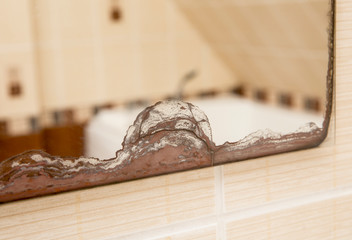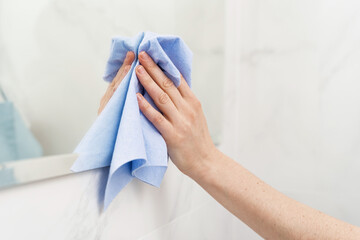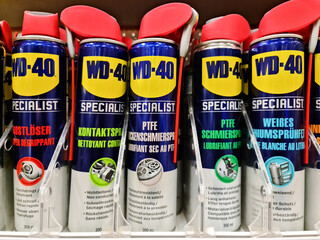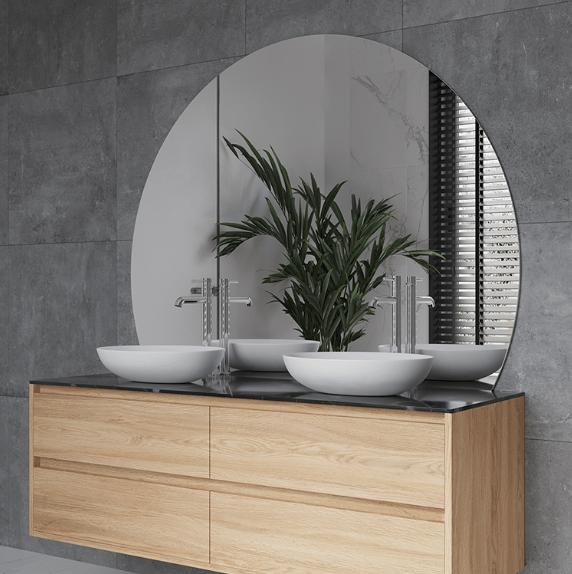It’s common for bathroom mirrors to rust due to the interaction of metal and water. At first, the rust is a minor issue that you simply shrug off or turn a blind eye to. But later on, the area it affects will spread into the mirror seams until it causes your bathroom mirror to rot.

If you want to prevent this from happening, you’ll want to know how to stop your bathroom mirror from rusting.
Why Do Bathroom Mirrors Rust?
Rust is a chemical reaction between metal and water that creates dark brown spots. In bathrooms, the metal on the mirrors is exposed to a ton of moisture from shower steam and splashing water. The result is rust spots around the areas exposed.
It's unavoidable to have moisture in your bathroom, so you must learn how to prevent the reaction from taking place. Certain things will make rusting more common, as well as types of mirrors that are more prone to it.
Where Does Mirror Rust Most Commonly Occur?
Mirror rust will show up in different areas of your bathroom mirror. Some of the most common places it occurs are:
- Metal brackets and chrome strips: These are the most exposed metal parts of the mirror, so they will see quicker damage.
How to Stop Your Bathroom Mirror from Rusting
Don’t give up if you have a rusty mirror. There are some ways you can fix it if the issue is minor and you caught it early, and more importantly, ways to prevent it in the future.
Choose the Right Cleaning Solution
Cleaning solutions are the leading agent in causing mirror desilvering. As such, you’ll want to avoid using ammonia-based glass cleaner. Go for ammonia-free cleaning solutions, like alcohol and vinegar, to clean your bathroom mirror. Note, however, that some of them may contain other potent chemicals that could affect the mirror sealant.
Don’t Spray Cleaner Directly on the Mirror
You’ll want to be cautious with any cleaning liquid that you apply directly on mirrors, as all chemicals have the potential to destroy their lamination. The best method is to spray the cleaner on a microfiber cloth and then wipe the mirror.

Dry Your Mirror and Ventilate the Bathroom
After a shower, make sure you dry your mirror. Wiping it with a towel will remove the excess moisture that may react with any exposed areas.
It’s also a smart idea to ventilate your bathroom to ensure the water that the towel misses has room to evaporate. Opening a bathroom window or door during or after your shower is key to letting the water escape.
Fix Rust Spots by Repairing the Silver Coating
If the mirror desilvering is quite bad, then you might need to go through a more extensive DIY process to fix it. It’s possible to resilver the silver backing to your mirror and make the damage look less noticeable. This is a good option if you want to keep a mirror with significant damage.
You can use WD-40, a straw, and a toothbrush to clean out rust that is in the mirror edges (this is where most desilvering occurs). It will allow you to get rid of as much rust as can be reached. The WD-40 will seal the mirror as well, preventing more rust in that area.

Choose the Right Kind of Mirror to Avoid Mirror Rusting Fully
If you don’t want to worry about mirror rust and mirror rot, the easiest thing to do is to choose the right type of mirror designed specifically for bathrooms.
Copper-Free Mirrors
Copper-free mirrors are state-of-the-art anti-corrosive mirrors specifically best for bathrooms and other moisture-exposed rooms. They have specialised silvering paint and an additional protective layer in them rather than the copper that most mirrors have.
The reflective surface on these mirrors will not chip or rust in humid environments like bathrooms. While they may cost slightly more than traditional mirrors, they're a worthy investment for the longevity they provide.

Framed Mirrors
If your bathroom tends to get constantly wet, you may want to consider buying a mirror with a frame for extra protection. Framed mirrors provide a physical barrier between the mirror edge and moisture, reducing the risk of rusting.
These are great options for bathrooms that don’t get airflow or mirrors that will be in a place that gets splashed often. It can also be a stylistic addition if you find the right frame.
Wrapping Up
While it may feel like you can get any normal mirror for the bathroom, you can’t deny that it’s a tricky place to have a metal item. To avoid rusting and mirror rot on your bathroom mirrors, follow the above tips on cleaning and fixing.
If you’re looking to replace or buy a bathroom mirror, it’ll be important to get the right kind that will last you a long time with no issues. Consider checking out our bathroom mirrors; they’re copper-free and, thus, stay rust-free.Once you've chosen a durable mirror, finding the right size is your next step. Learn more in our guide on bathroom mirror sizing.




